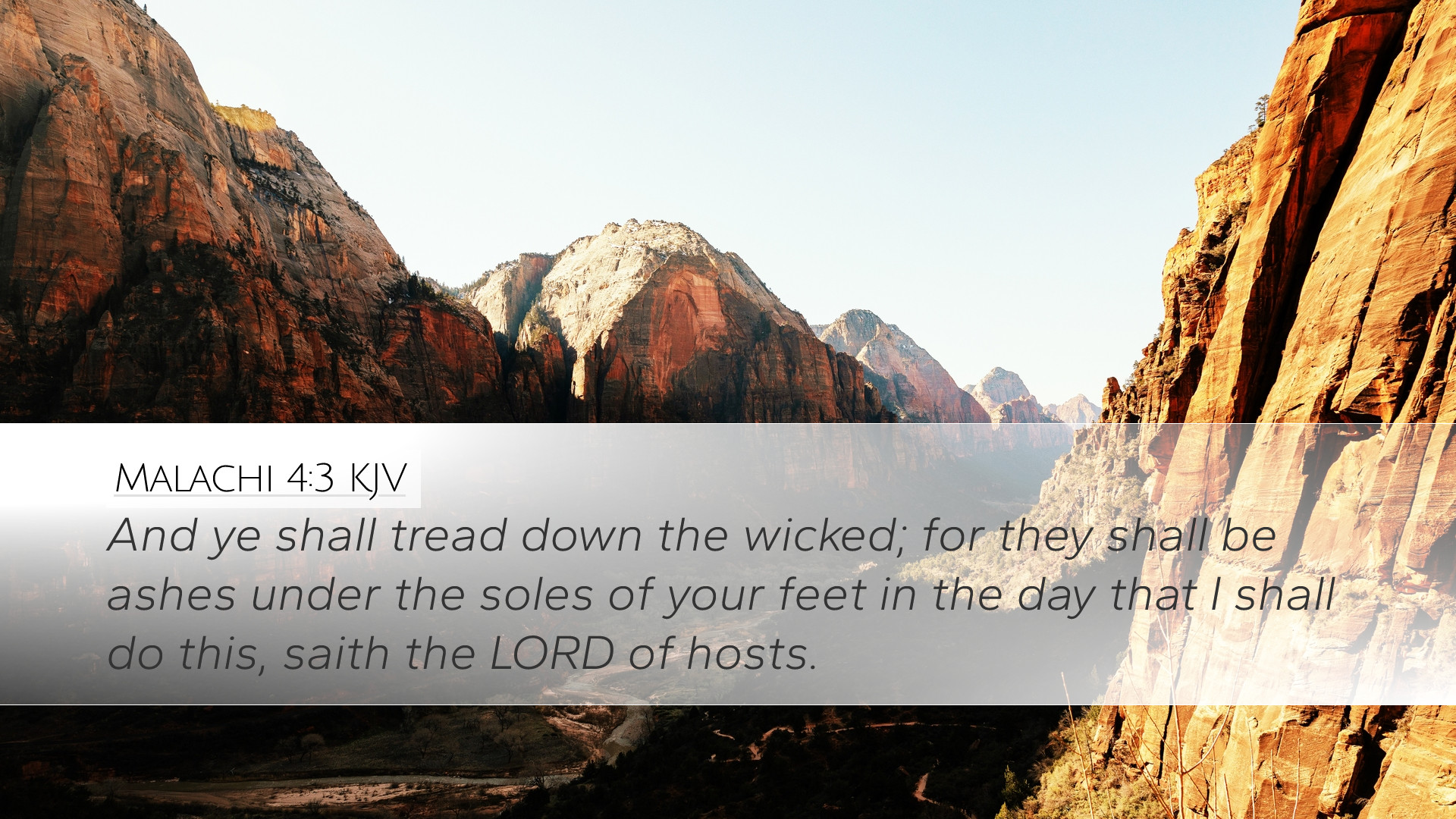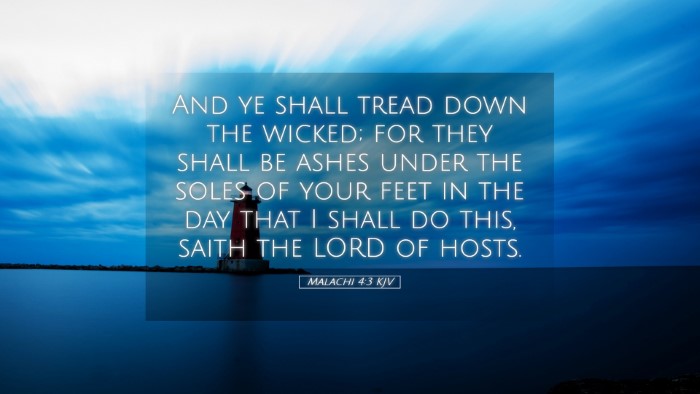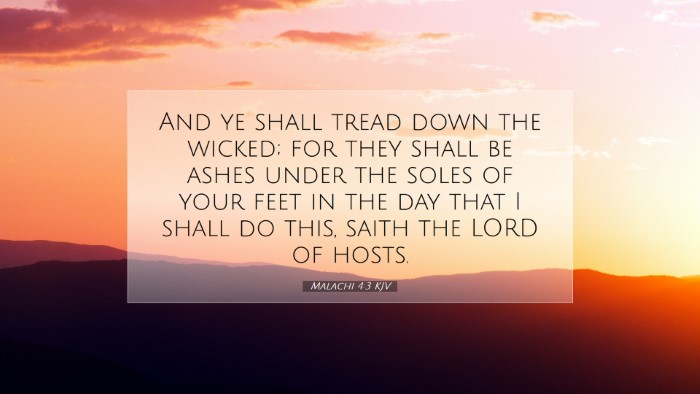Old Testament
Genesis Exodus Leviticus Numbers Deuteronomy Joshua Judges Ruth 1 Samuel 2 Samuel 1 Kings 2 Kings 1 Chronicles 2 Chronicles Ezra Nehemiah Esther Job Psalms Proverbs Ecclesiastes Song of Solomon Isaiah Jeremiah Lamentations Ezekiel Daniel Hosea Joel Amos Obadiah Jonah Micah Nahum Habakkuk Zephaniah Haggai Zechariah MalachiMalachi 4:3
Malachi 4:3 KJV
And ye shall tread down the wicked; for they shall be ashes under the soles of your feet in the day that I shall do this, saith the LORD of hosts.
Malachi 4:3 Bible Commentary
Commentary on Malachi 4:3
Verse Context: Malachi 4:3 reads: "And ye shall tread down the wicked; for they shall be ashes under the soles of your feet in the day that I shall do this, saith the Lord of hosts."
1. Historical Background
Malachi, the last of the Old Testament prophets, addresses the people of Israel after their return from Babylonian exile. The prophet speaks into a context of spiritual and moral decay, where the people have become apathetic towards God and His laws. The message of judgment, hope, and restoration interweaves throughout Malachi’s prophecy, with Malachi 4 encapsulating the final promise of divine vindication.
2. Exegetical Insights
The phrase "ye shall tread down the wicked" signifies a future victory for the righteous over the unrighteous. The imagery used evokes themes of conquest and divine justice, suggesting an eschatological confrontation where God’s people will triumph over their adversaries. This verse builds on the themes of judgment and restoration as outlined throughout Malachi.
2.1. Righteous vs. Wicked
Matthew Henry highlights the contrast: The "wicked" refers to those who persist in rebellion against God, rejecting His covenant. In contrast, the "ye" denotes the faithful remnant, the true followers of Yahweh. The text assures the faithful that their endurance through trials will lead to ultimate victory.
2.2. Imagery of Ashes
Albert Barnes elaborates on the imagery: The depiction of the wicked as "ashes" indicates total consumption—both physical and spiritual. Ashes signify defeat and loss, where the glory of the unfaithful is reduced to nothingness before the might of God. This literary device emphasizes the comprehensive nature of divine judgment.
3. Theological Implications
This verse strongly reaffirms significant theological concepts such as divine justice, righteousness, and eschatological hope. The ultimate triumph over evil is rooted in God's sovereign authority and faithfulness to His covenant people.
3.1. Divine Justice
Malachi 4:3 serves to reassure believers that, although they face present trials and tribulations, God's justice will prevail. Adam Clarke comments: "The day when the Lord shall act with decisiveness against the wicked instills hope in the hearts of the faithful." This verse calls upon believers to endure patiently, trusting in God’s ultimate vindication.
3.2. Eschatological Hope
The notion of a future day of reckoning resounds throughout scripture. In this verse, it invites reflection on the "Day of the Lord," a recurring theme in the prophetic literature that signals God's intervention in human history. It assures the faithful of their reward and the establishment of God's kingdom, where righteousness prevails.
4. Practical Applications
For pastors, students, and theologians, this verse encourages congregations to hold fast to their faith amidst adversity. It also offers a profound reminder of the end times when God's promise will be wholly fulfilled.
4.1. Encouragement in Trials
Believers are called to find comfort in the promises of God, ensuring them that their struggles are seen and will ultimately lead to victory as they stand firm in righteousness. This verse serves as a powerful encouragement to maintain hope and resilience against spiritual apathy and societal injustices.
4.2. Call to Righteousness
The juxtaposition of the righteous and the wicked in Malachi 4:3 is a call to introspection within the church community. It implores believers to examine their lives and adhere to God’s commandments, thereby reinforcing the principles of holiness and accountability.
4.3. Proclamation of Assurance
Furthermore, church leaders should proclaim the assurance found in this passage, teaching congregants about the certainty of God’s judgment and justice while also highlighting His faithfulness to restore and redeem those who turn back to Him in humility and obedience.
5. Conclusion
Malachi 4:3 serves as a profound conclusion to the prophetic writings, encapsulating essential themes of victory, justice, and hope. It encourages the faithful to walk in righteousness, assures them of their ultimate triumph, and reminds them of the assured retribution awaiting the wicked. For today's believers, grasping the depth of this message can cultivate a steadfast faith capable of enduring life’s challenges in anticipation of God's fulfillment of His promises.


